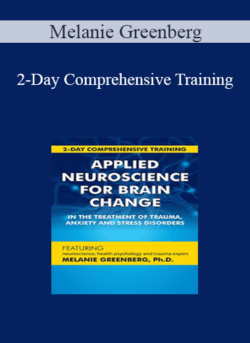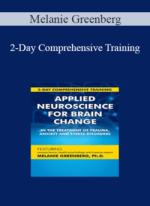[Instant Download] – Immediately deliver the download link after receiving the paymentPurchase Melanie Greenberg – 2-Day Comprehensive Training: Applied Neuroscience for Brain Change in the Treatment of Trauma, Anxiety and Stress Disorders courses at here with PRICE $439.99 $83Faculty:Melanie GreenbergDuration:12 Hours 10 MinutesFormat:Audio and VideoCopyright:Jul 12, 2018 Manual – Applied Neuroscience for Brain Change (16.30 MB) 161 Pages Available after Purchase OutlineUsing Neuroscience in Treatment of Stress and TraumaPositives:Science gives authority, evidence, de-stigmatizes mental health problemsIncreased motivation and hope for changeConcerns: Oversimplification, unrealistic expectations, changing state of science, see self as damaged or differentThe Promise of NeuroplasticityDescribe neuroplasticity in everyday languageTherapy is about creating a new, more resilient brainWe are changing beings – don’t have to be stuck in rigid views of selfTeach brain to be less reactive to stress and triggers“Rewiring” as a metaphor for changeChanging “raw,” unprocessed memories to organized narrativesThe Brain’s Stress ResponseHistorical view – Hans SelyeThe brain’s stress response “fight, flight, freeze”The triune brain – reptilian, mammalian, humanThe amygdala and the prefrontal cortexHow the amygdala “hijacks” the brain into emergency modeHow the Stress Response is Spread Throughout the BodyNeurotransmitters – Epinephrine, norepinephrine and cortisolThe HPA axis and role of cortisolThe sympathetic and parasympathetic nervous systemsThe dorsovagal “freeze” response to unavoidable threatThe Upside and Downside of StressIncreased motivation and engagement – “flow”stateCan create mental toughness and resilience to future stressorsInflammatory response to chronic stressStress and health risk behaviors (excess alcohol use, smoking, overeating etc)Stress and cellular aging (telomeres)Traumas – Effects on the BrainCortisol attacks the hippocampus – center of narrative memoryAmygdala response increases in strengthImpaired anterior cingulate cortex (ACC) and prefrontal cortical functionCortisol halts production of BDNF – fewer new brain cells formedLink to depression, anxiety disorders, PTSDCognitive rigidity and inability to take in new informationChanges in sense of self and dissociationLong-Term Impact of Adverse Childhood Experiences (ACEs)The ACE Study (Kaiser and the CDC)Addictive and unhealthy ways of managing anxiety & negative emotionsDisease, mental health issues, behavioral problems, PTSDExplaining Neuroscience Concepts to ClientsUse drawings and imagesIndividualize to the type of difficulty (e.g., disengaged vs reactive – different brain areas)Redirect vs eliminateHelp client label & recognize when happening (e.g., freeze, flooding, negative thinking, rigidity, impulsivity)Find coping strategies for each type of brain difficultyStress-Proofing the Brain – OverviewCalming the amygdala – Grounding, mindfulness, self-compassion, perceiving controlMoving forward with the prefrontal cortex – Cognitive reappraisal, priming positive mindsets and, growth focus, health psychology toolsGrounding Strategies for Clients with Trauma or Attachment InjuriesYoga, relaxation, breathing, present-moment focus, soothing with the senses, pets, drawing, gardening, walkingMental imagery – safe place, boundaries, energetic, times they felt strong/competentLeft-brain strategies – task focus and engagementMindfulness StrategiesQualities of mindfulness states – open, nonjudgmental, fluid, deliberate,Observing and accepting inner experience (thoughts, feelings, sensations)Using the senses to self-regulateDe-fusing from negative thoughts and self-imagesHow mindfulness changes the brainMindfulness practices – breathing, watching thoughts, urge surfing, open awarenessApplication to anxiety, depression, addictions, PTSDSelf-Compassion StrategiesSelf-kindness, common humanity, focus on unmet needsApplication to depression, anxiety, stress-management, trauma, insecure attachmentLink to Schema Therapy – healthy adult modePractices – Metta meditation, soften, soothe and allow, dialogues with inner criticCognitive StrategiesHow stress and anxiety narrow attention, create cognitive rigidityDepression and negative thinkingPTSD and internalized negative appraisals (helpless, unworthy, unsafe etc.)Worry and rumination cycles – link to prefrontal cortex and default mode networkWhy thought suppression doesn’t workDe-catastrophizing and probability estimationExposure and tolerating negative thoughtsUsing metaphors (monsters on the boat, bouncy ball underwater)Creating Positive States of Mind to Counter StressHow our brains are wired to the negativePositive emotions can promote physiological recovery from anxiety and fearReappraising anxiety as excitementGratitude diariesCommitment, control, and challenge; growth mindsetLiving Healthy in the Face of StressSleep disturbance – behavioral strategiesHealthy coping strategies – exercise, meditation, yogaDealing with emotional eatingFacultyMelanie Greenberg, PhD Related seminars and products: 3 Melanie Greenberg, PhD, is a practicing psychologist, author, speaker, and executive coach with more than 20 years of professional experience. She has an active practice in Mill Valley, CA where she sees individuals and couples, teens and adults. Originally from South Africa, Melanie has a passion for psychological growth and healing. She loves to challenge, inspire and motivate. Melanie is the author of The Stress-Proof Brain (New Harbinger, 2017) – an Amazon bestseller in neuropsychology, stress-management, and health. She writes the popular Mindful Self-Express blog for Psychology Today (8 million page views) and has a substantial social media following. Melanie is a former professor in the clinical psychology Doctoral Program at Alliant International University, San Diego. She has delivered talks and workshops to national and international audiences, businesses, nonprofits, and professional organizations, including The American Psychological Association, Wisconsin Psychological Association, Society of Behavioral Medicine, and The Bay Club. She has also published more than 50 research articles and scholarly products. A popular media expert, she has been featured on CNN, Forbes, Inc., Business Insider, BBC radio, ABC News, Yahoo, AOL, and Lifehacker, as well as in Self, Redbook, Women’s Health, Men’s Health, Fitness Magazine and the Huffington Post. She has also been featured on radio shows and numerous podcasts. With almost 50,000 followers, she was named one of the Top Psychologists to follow on Twitter by The British Psychological Society. www.drmelaniegreenberg.comSpeaker Disclosure:Financial: Melanie Greenberg is in private practice. She is an author for New Harbinger Publications and Psychology Today and receives royalties. Dr. Greenberg receives a honorarium from the Community Institute for Psychotherapy and National Charity League. She receives a speaking honorarium from PESI, Inc.Non-financial: Melanie Greenberg is a member of the American Psychological Association; and California Psychological Association. Salepage: https://catalog.pesi.com//item/2day-comprehensive-training-applied-neuroscience-brain-change-treatment-trauma-anxiety-stress-disorders-50930Archive: https://archive.ph/wip/yI756Purchase Melanie Greenberg – 2-Day Comprehensive Training: Applied Neuroscience for Brain Change in the Treatment of Trauma, Anxiety and Stress Disorders courses at here with PRICE $439.99 $83
 Yoni Massage Online Course – Mariah & Phil
₹7,138.00
Yoni Massage Online Course – Mariah & Phil
₹7,138.00
 Viking Lifestyle – The Fuckboy frame – Tim
₹8,798.00
Viking Lifestyle – The Fuckboy frame – Tim
₹8,798.00
Melanie Greenberg – 2-Day Comprehensive Training: Applied Neuroscience for Brain Change in the Treatment of Trauma, Anxiety and Stress Disorders
₹13,778.00






